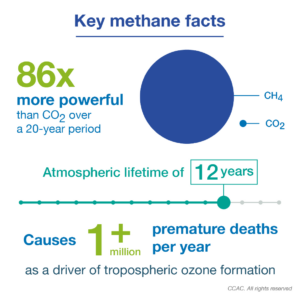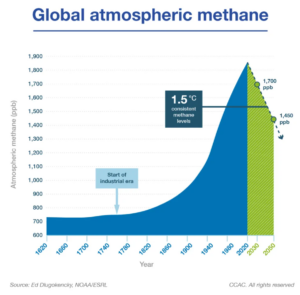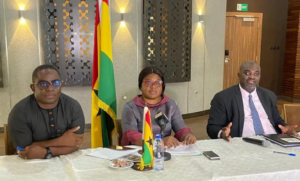
The (G-MRAP) is the development and implementation of transparent and consistent national methane roadmaps with support from the Climate and Clean Air Coalition as the first point of call for countries which have undertaken the Global Methane Pledge (GMP).
The roadmap seeks to help coordinate and accelerate progress on identification and development of relevant methane targeted measures and support policies and in the context of Ghana’s National Determined Contributions (NDCs) revision.

The workshop held last Monday May 27, 2024, in Aburi as part of a critical component in a broader climate change mitigation strategy brought together researchers from the energy, finance, Academia, petroleum, and agricultural sector.
Other participants included experts from the Climate and Clean Air Coalition (CCAC) and the United Nations Development Programme (UNDP) Ghana.
In her keynote address, the Minister of Environment, Science, Technology, and Innovation (MESTI), Hon. Ophelia Mensah Hayford, said “cutting emissions requires deliberate planning to target each emission source or activity type and importantly, all forms of gases, with attention to creating the needed transformational socio-economic outcomes”.
She explained that Ghana’s Methane Roadmap is expected to feed into the revision or update of the Nationally Determined Contribution (NDC) and the development of the Long-term Low Emission Development Strategy (LT-LEDS).
Reducing emissions
The Director Environmental Assessment and Management (EA&M) at the EPA, Mr. Kingsley Ekow Gura-Sey, said methane is a potent greenhouse with a short-term impact on the climate, hence reducing emissions is vital in achieving the country’s climate targets and enhancing the health and well-being of communities.
He commended the Climate and Clean Air Coalition (CCAC) for their strides in launching the G-MRAP aimed at developing methodologies and providing support for countries like Ghana in methane mitigation planning, stating: “Ghana is well-positioned with help from the Stockholm Environment Institute to develop a national roadmap.”

For her part, a representative from the Climate and Clean Air Coalition (CCAC), Ms. Catalina Etcheverry, said since Ghana joined the Coalition in 2012, it has been committed to aggressive action on Short-lived climate pollutants (SLCPs), particularly through the series of ambitious national plans.
She said “the country is also signatory to the Global Methane Pledge (GMP). The GMP is voluntary pledge by countries in meeting the Global Methane target of reducing methane emissions by 30% below 2020 levels by 2030 which would reduce global warming by at least 0.20C by 2050.”
She further indicated that that the CCAC through its Global Methane Roadmap Programme, supports countries with the development and implementation of transparent and consistent National Methane Action plans including:
- Built from the decade-long experience and methodology of CCAC National Planning
- Support countries to identify, analyze and build on existing commitments/plans/activities using a transparent and harmonized methodology.
- Provides a common baseline for collective action and tracking.
- Non-prescriptive format flexible enough to support identification and articulation of current commitments and opportunities for increased ambition.
- Supports rapid identification of gaps and weaknesses which can be filled by CCAC Partners and Hubs. Pipeline of projects.
Ms Etcheverry added that the results of the roadmap will strengthen Ghana’s NDC revision process which includes a variety of Short-lived climate pollutants (SLCP) mitigation goals aligned with the CCAC’s work.